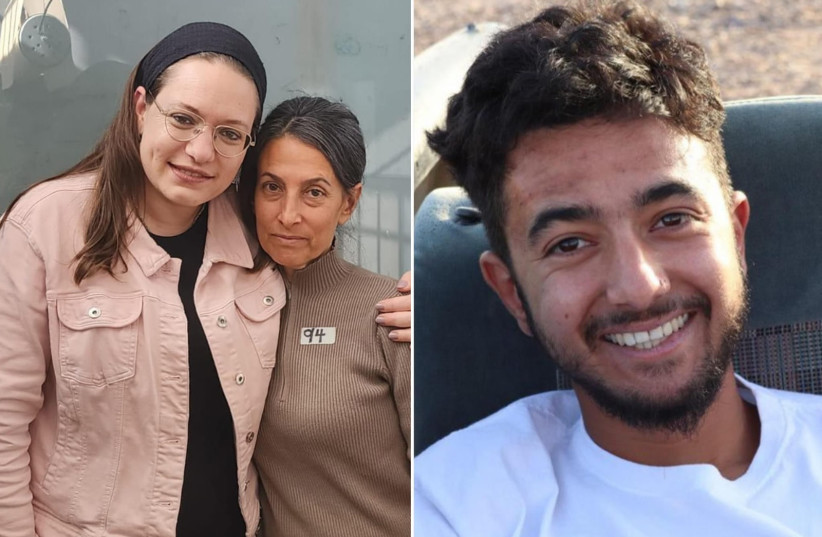This is not just a heartwarming picture. At a time when we see the madness on the college campuses in the United States and the world's hypocrisy regarding Hamas, it is also an important image: Four-year-old Abigail Idan in the arms of US President Biden.
"And here the child asks." It says in the Passover Haggadah, preceding “Ma Nishtana.” The children, the next generation, need to ask their parents questions. Their parents, in response, need to answer and explain to them the world, the reality, the optimistic story of Passover that has been giving hope for thousands of years, a story that reminds us that in the end, good triumphs over evil, and humanity prevails.
Pictured here is a little girl who has no parents to whom she can address her questions. Abigail's father, the photographer Roi Idan, and her mother, Smadar, were murdered on October 7 at Kibbutz Kfar Aza, and Abigail herself was kidnapped to Gaza.
In the arms of the president of the world's most powerful superpower, the most difficult questions echo in the Oval Office of the White House: "And here the daughter asks, ‘Will the world even know how to clearly distinguish that Abigail is on the good and right side of history and that the other side is the enemy of all humanity?’”
A timeless “Matza Message” from Columbia University
I wrote this article while the second day of Passover was being celebrated in the United States. Jews who live outside of Israel observe an additional festival day. Just before Passover, the Chabad emissary to the Columbia University campus shared an important message: “In the last hours before Seder night, I walked around campus and gave out matzahs to Jewish students and lecturers. I wanted them to know that when Jews see a rabbi who walks with pride, with a smile, and with matzahs, they understand that they are not alone, since we are all in this together. Later, there were more than 100 participants at our Seder table.

“Many Jewish students went home for the holiday, but for whoever stayed — we made sure they had an escort from the Chabad House to their dormitories at the completion of the Seder. Such is the present situation, to our dismay.
“But we will not surrender to the forces of evil. We will sing and dance on both Seder nights and we will not hide. ‘In every generation they rise up against us to destroy us’ — and even prestigious Columbia faculty members can be our enemy.
“In Jewish sources, matzah is called both ‘bread of faith’ and ‘bread of healing.’ This is exactly what we need at present. Faith in the justice of our cause, faith that God is on our side, faith that we are part of a magnificent story, that we are on the right side of history — and healing as the world needs to heal itself from the scourge of antisemitism and hatred.”
Righteous women, then and now
Rachel Goldberg-Polin, the mother of Hersh who was taken hostage on October 7, was chosen by TIME Magazine as one of the 100 most influential people in the world. I have personally felt this to be true for a long time. She influences me enormously and I quote her regularly in my lectures.
In Israel she is less well-known, but outside of Israel - wow. Rachel addressed the UN, she spoke with Biden and also spoke at the Washington, DC rally in November, when 300,000 gathered in support of Israel. She is interviewed non-stop, appears on podcasts, and is invited to many different events abroad.
When we met, she showed me a video on her cell phone that she had received that morning. It showed girls in Chicago giving tzedakah for “Hersh ben Hannah Pearl” (Rachel’s Hebrew name). “This gave me the strength to get out of bed this morning,” she said. She got up and marked on her lapel the number of days of his captivity, as is her custom each morning, and went out to greet another day.
Rachel relates how as a young woman she chose to return to her heritage, became religious and made Aliyah. She appeals to the world’s sense of justice and morality and to our own Jewish values, awakening hidden sparks of our identity. When she shouts “Bring them home now,” she is not only speaking of the hostages but of all the distant members of our nation in the Diaspora who hear her and are reminded of who they are and are thus inspired to return home.
Our Sages state that “in the merit of righteous women we were redeemed from Egypt.” The women in that generation knew how to keep their faith in the midst of hardship and to demand a better life. In the merit of such righteous women, we too will be redeemed.
Translated by Yehoshua Siskin, Janine Muller Sherr.
Want to read more by Sivan Rahav Meir? Google The Daily Thought or visit sivanrahavmeir.com.
